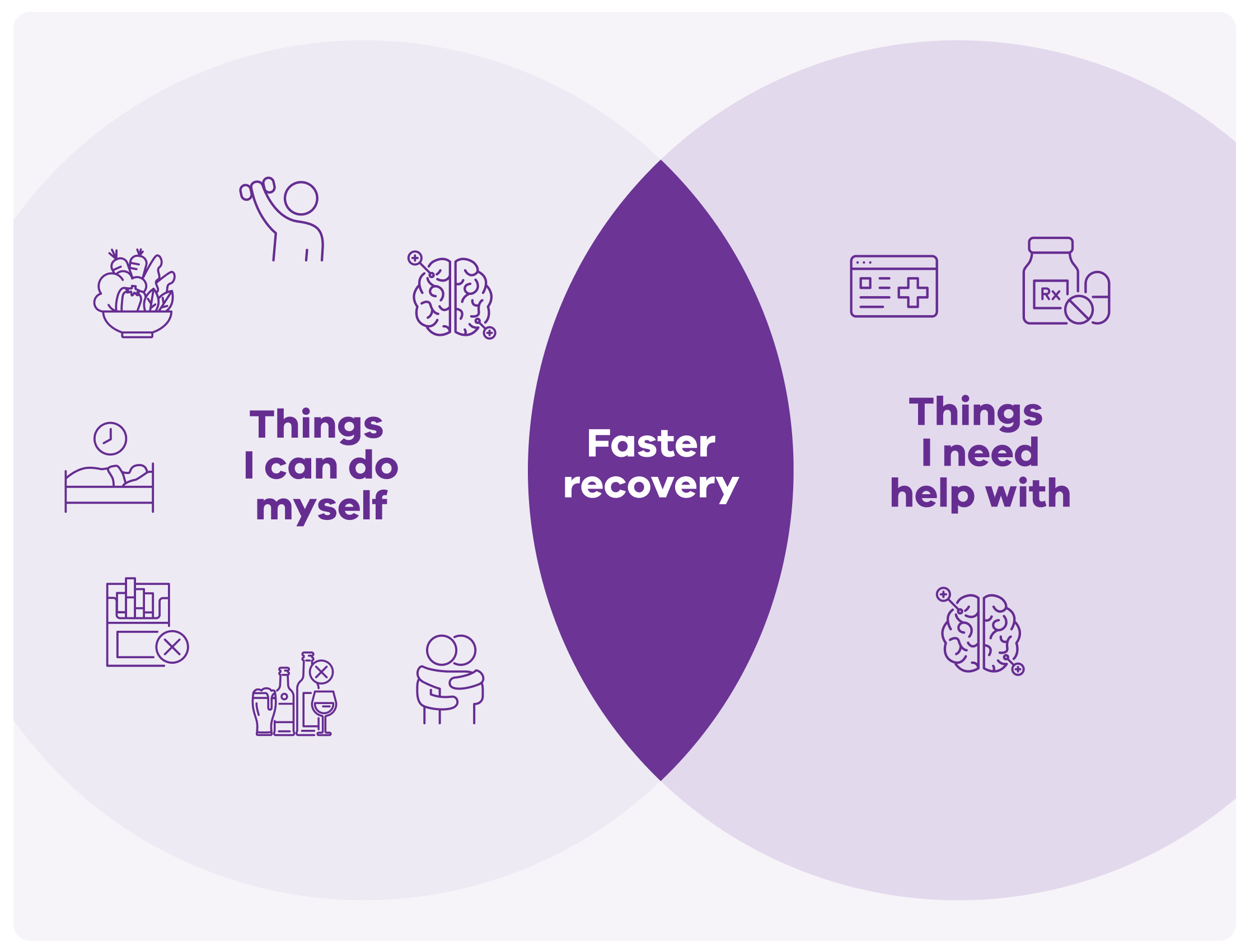Staying active and eating well before your surgery will help your recovery.
Book a GP appointment in the months before your surgery if you have other health conditions that need management
Speak to your healthcare team about your surgery options, if you are:
- over 65 years old
- not very active
- needing help with daily tasks
- losing your balance easily or have fallen over before
- having difficulty with memory and thinking.
Once you’ve decided to have surgery you will be asked to give your informed consent. You can refuse or withdraw your consent at any time before the surgery.
See the Getting ready for surgery and my recovery checklist, which you can print or complete on your phone, tablet or computer.

Things I can do to boost my health before surgery
There are key things you can do to boost your health before surgery with the guidance of your healthcare team.
Here is a list of what you can do to help have a faster recovery:
- Exercise – staying active before your surgery is important and can help you get stronger so your body can repair quickly. You can complete self-directed exercise, for example, daily walks, or you can see an allied health professional such as a physiotherapist for an exercise program.
- Diet and nutrition – eating a healthy diet before your surgery will help your recovery. Getting the right nutrition assists with:
- fast wound healing
- optimising and maintaining your weight
- building and maintaining your strength.
- Mental health/emotional wellbeing – mentally preparing for surgery is as important as preparing physically. The leadup to surgery can be stressful. Some things you can do to help manage this are talking to your support person, regular exercise and speaking with your healthcare team.
- Alcohol intake – it is advised not to drink alcohol, or limit your alcohol intake, in the months before your surgery.
- Smoking, vaping, and illicit drugs – avoiding smoking, vaping and the use of illicit drugs in the months leading up to your surgery. If this is difficult for you, speak with your healthcare team. For more information, see the Quit website.
- Sleep – have a regular sleep pattern leading up to your surgery and try to maintain this pattern during your recovery.
- Intimacy – the type of surgery you have may impact on relationship intimacy. To get information that is relevant to you, discuss this with your healthcare provider. There may be some activities you need to refrain from during your recovery.
If you need extra support to prepare yourself for surgery, there may be optimisation programs to help you. Ask your healthcare team for more information.
Things I need help with
Reviewing my medical conditions
Meeting with your local doctor (GP) to review your medical conditions is recommended as they can impact on surgical outcomes. It can take time to optimise medical conditions, so it is helpful to make a GP appointment well in advance of your surgery.
If your other health conditions aren’t stable, there is a potential that your surgery could be delayed. Some examples of the things your local doctor may review are:
- Medications – it is important to discuss what medications you are on and if any of these need to be stopped or changed before your surgery. Stopping or pausing medications can pose a risk and it is important this is monitored closely with your healthcare team. Your doctor or pharmacist can also review if you are at risk of taking too many medications at once, this is known as polypharmacy.
- Mental health – if you are concerned about your mental health or feel nervous about your surgery, then speak with your healthcare team to prepare for the surgery.
- Medical conditions – there are several conditions including chronic conditions that you should review with your doctor in the months before your surgery. Some of the more common conditions you should talk to your healthcare team about are:
- anaemia (lack of healthy red blood cells)
- heart disease
- atrial fibrillation (abnormal heart rhythm)
- diabetes
- high or low blood pressure.
It’s also important that you share your health history and discuss the risks of surgery with your healthcare team. For more information, see About shared decision making.
Tests before my surgery
Before your surgery, your healthcare team might request some tests. These tests will vary depending on the surgery you are having. Some common tests are blood tests or x-rays. These may also need to be done after your surgery. It is important to have these tests done to ensure your surgery is not delayed or cancelled.
If you are having difficulty getting these tests done, make sure you discuss it with your health care team.
Check with your healthcare team to see if you need to bring any test results with you on your day of surgery.

